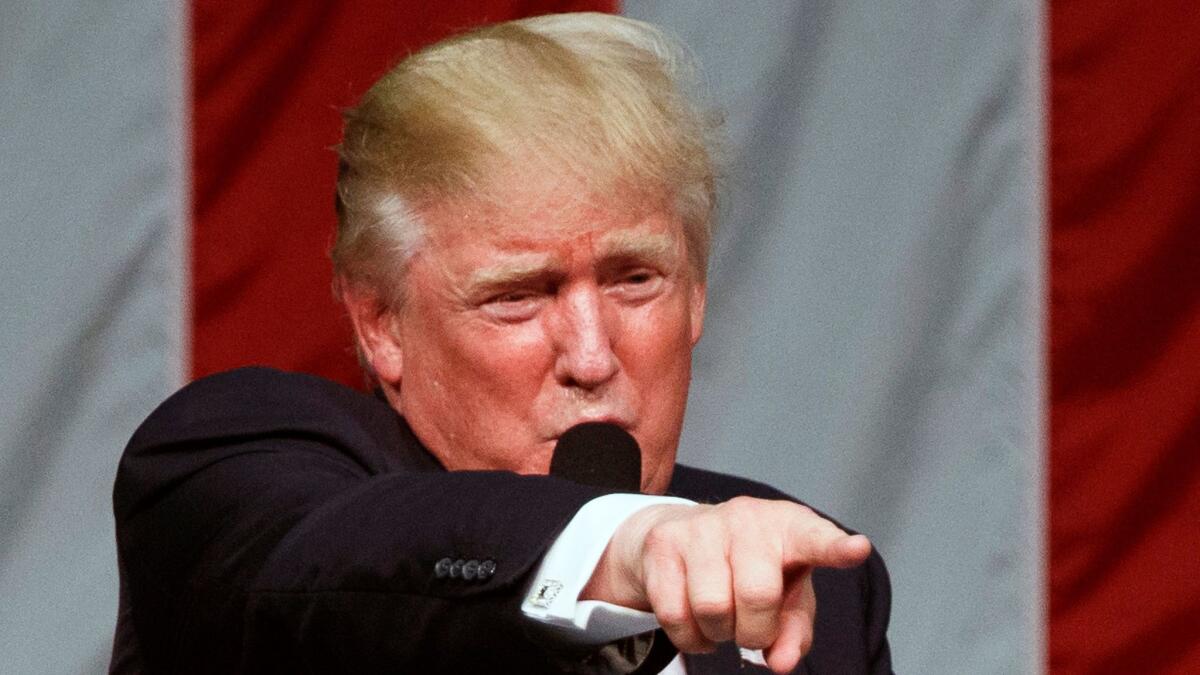Editorial: On libel law, Trump rejects ‘America First’

- Share via
Eight months after he promised that if elected he would “open up our libel laws,” Donald J. Trump has provided a few more specifics about what changes he would like to see in that area of the law. Essentially Trump thinks that, when it comes to suing the press, the U.S. should be more like England.
Trump recently told an interviewer that “in England they have a system where you can actually sue if someone says something wrong. Our press is allowed to say whatever they want and get away with it.”
Trump isn’t an expert on libel law, any more than he is on many of the other topics he spouts off about. For example, presidents can’t “open up” libel laws, which are enacted by state legislatures. (The only way a president could affect libel law would be through his appointments to the Supreme Court, which reviews libel judgments for potential conflicts with the Constitution.)
Referring to his history of filing lawsuits, a committee of the American Bar Assn. concluded in a report that Trump was a ‘libel bully.’
And of course his interest in the subject is selfish. He has threatened to sue the New York Times and the women who have accused him of sexual misconduct. That isn’t a new impulse for Trump. Referring to his history of filing lawsuits, a committee of the American Bar Assn. concluded in a report that Trump was a “libel bully.” (Ironically, according to the New York Times, the ABA refused to release the report for fear of being sued by Trump. The ABA has disputed the story, saying that the organization did not suppress the report but did suggest changes and that the author decided to publish the findings elsewhere.)
We have a selfish interest too, clearly. But the protections news organizations receive under the U.S. Constitution also benefit the citizens who depend on the press, in its traditional and new forms, for information.
Trump is correct in one respect: In some ways it is harder to sue the news media in the United States than it is in England. But that is a feature, not a bug, of the American legal system. It’s known as the 1st Amendment.
It is that amendment’s protection of free speech and freedom of the press that the Supreme Court has invoked in a series of decisions that have transformed the law of libel by making it harder for plaintiffs, particularly public figures such as Trump, to collect damages for articles they claim hold them up to ridicule.
In the landmark 1964 case of New York Times vs. Sullivan, the court ruled that public officials (a category later broadened to include other public figures) can prevail in a libel action only if they can prove that a defamatory falsehood was made with knowledge of its falsity or with reckless disregard for whether it was true or false.
The court acknowledged that the rule it was establishing might protect some false speech. But Justice William Brennan wrote for the court’s majority that “erroneous statement is inevitable in free debate, and … it must be protected if the freedoms of expression are to have the breathing space that they need ... to survive.”
Twenty-two years later, in a case called Philadelphia Newspapers v. Hepps, the court made it clear that even when a private individual sues for libel, the plaintiff bears the burden of proof as to whether the story was true or false — so long as it concerns “matters of public concern.” The ruling overturned a Pennsylvania law that required a newspaper sued for libel to prove that the story was true.
Writing for the court, Justice Sandra Day O’Connor acknowledged that requiring plaintiffs to prove that a story was false might result in some cases in which a newspaper escaped responsibility for an untrue story. But she said that placing the burden of proof on the newspaper created the possibility of a different sort of injustice: A story might be perfectly true but the newspaper could be forced to pay damages anyway because it couldn’t prove that it was true.
Faced with this dilemma, O’Connor concluded that the court must tip the scales in favor of the press, to “ensure that true speech on matters of public concern is not deterred.”
In England — and we suspect that this is why Trump prefers its version of libel law — the burden of proof remains with the newspaper. That doesn’t mean that the English legal system is evil or irrational, only that its priorities are different.
At the risk of seeming to defend a vested interest, we prefer the American approach. It furthers what the Supreme Court in New York Times vs. Sullivan called “a profound national commitment to the principle that debate on public issues should be uninhibited, robust, and wide-open.” Even if it makes Donald Trump uncomfortable.
Follow the Opinion section on Twitter @latimesopinion and Facebook
More to Read
A cure for the common opinion
Get thought-provoking perspectives with our weekly newsletter.
You may occasionally receive promotional content from the Los Angeles Times.










